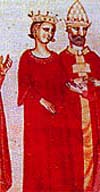Isabella II of Jerusalem
| Isabella II | |
|---|---|
 The death of Queen Isabella (From MS of William of Tyre's Historia and Old French Continuation, painted in Acre, 13C. Bib. Nat. Française) | |
| Queen of Jerusalem | |
| Reign | 1212 – 4 May 1228 |
| Coronation | 1225 |
| Predecessor | Maria |
| Successor | Conrad II |
| Co-ruler | John (1212–1225) and Frederick (1225–1228) |
| Holy Roman Empress; Queen consort of Sicily and Germany | |
| Tenure | 1225 – 4 May 1228 |
| Born | c. 1212 |
| Died | 4 May 1228 (aged 15–16) Andria, Kingdom of Sicily |
| Burial | |
| Spouse | Frederick II, Holy Roman Emperor |
| Issue | Conrad II of Jerusalem |
| House | House of Brienne |
| Father | John of Brienne |
| Mother | Maria of Montferrat |
Isabella II (1212 – 4 May 1228), sometimes erroneously called Yolanda,[1] was a princess of French origin, the daughter of Maria, the queen-regnant of Jerusalem, and her husband, John of Brienne. She was reigning Queen of Jerusalem from 1212 until her death in 1228. By marriage to Frederick II, Holy Roman Emperor, Isabella also became Holy Roman Empress and Queen of Sicily and Germany.
Infant Queen
[edit]Isabella II was born in Andria, in the southern Italian Kingdom of Sicily. She was the only child of Maria of Montferrat, Queen of Jerusalem, and John of Brienne.[2] Maria was the daughter of Queen Isabella I of Jerusalem by her second husband Conrad I, and heiress, on her mother's death, of the Kingdom of Jerusalem.
Maria died shortly after giving birth to Isabella II in 1212,[3] possibly by puerperal fever. Because of this, Isabella II was proclaimed Queen of Jerusalem when she was only a few days old. Because her father John did not have a direct claim on the throne, he ruled as regent.
Marriage with Frederick II
[edit]
During a meeting between John of Brienne, Pope Honorius III and Frederick II in the city of Ferentino in 1223, Isabella's fate was decided: Frederick accepted to finally go to the Crusade, but only as the legitimate King of Jerusalem, and this was only possible if he agreed to take the young Queen Isabella II as his wife (by this time, Frederick was a widower).[4] This was planned by the Pope, who hoped by this bond to attach the Emperor firmly to the Sixth Crusade. The betrothal was confirmed, but the Emperor still delayed his departure until August 1225, when he and Isabella were married by proxy in the City of Acre.[5] Days later, Isabella II was crowned as Queen of Jerusalem.
Isabella arrived in Italy with twenty galleys sent by Frederick II to bring her to her father and married in person to Frederick II in the cathedral of Brindisi, on 9 November 1225.[6] During the ceremony, Frederick declared himself King of Jerusalem and immediately saw to it that his new father-in-law John of Brienne, the current regent of Jerusalem, was dispossessed and his rights transferred to him. The contemporary chronicles described the exotic wedding celebrations, which took place in the Castle of Oria, and the indignant reaction of her father John of Brienne, now without royal authority.
Death
[edit]After the wedding, Isabella was kept in seclusion by her husband, in Palermo.[6] Aged 14, in November 1226, she gave birth to her first child, a daughter (referred to by some sources as Margaret); the baby died in August 1227. On 25 April 1228 Isabella gave birth to her second child, a son, Conrad, in Andria, Bari, but a few days later, on 4 May, she died following childbirth complications.[6] She was buried in the Andria Cathedral.
Ancestry
[edit]| Ancestors of Isabella II of Jerusalem | |||||||||||||||||||||||||||||||||||||||||||||||||||||||||||||||||||||||||||||||||||||||||||||||||||||||||||||||||||||||||||||||||||||||||||||||||||||||||||||||||||||||||||||||||||||||||||||||||||||||||||||||||||||||||||||||||||||||||||||||||||||||||||||||||||||||||||||||||||||||||
|---|---|---|---|---|---|---|---|---|---|---|---|---|---|---|---|---|---|---|---|---|---|---|---|---|---|---|---|---|---|---|---|---|---|---|---|---|---|---|---|---|---|---|---|---|---|---|---|---|---|---|---|---|---|---|---|---|---|---|---|---|---|---|---|---|---|---|---|---|---|---|---|---|---|---|---|---|---|---|---|---|---|---|---|---|---|---|---|---|---|---|---|---|---|---|---|---|---|---|---|---|---|---|---|---|---|---|---|---|---|---|---|---|---|---|---|---|---|---|---|---|---|---|---|---|---|---|---|---|---|---|---|---|---|---|---|---|---|---|---|---|---|---|---|---|---|---|---|---|---|---|---|---|---|---|---|---|---|---|---|---|---|---|---|---|---|---|---|---|---|---|---|---|---|---|---|---|---|---|---|---|---|---|---|---|---|---|---|---|---|---|---|---|---|---|---|---|---|---|---|---|---|---|---|---|---|---|---|---|---|---|---|---|---|---|---|---|---|---|---|---|---|---|---|---|---|---|---|---|---|---|---|---|---|---|---|---|---|---|---|---|---|---|---|---|---|---|---|---|---|---|---|---|---|---|---|---|---|---|---|---|---|---|---|---|---|---|---|---|---|---|---|---|---|---|---|---|---|---|---|---|---|
| |||||||||||||||||||||||||||||||||||||||||||||||||||||||||||||||||||||||||||||||||||||||||||||||||||||||||||||||||||||||||||||||||||||||||||||||||||||||||||||||||||||||||||||||||||||||||||||||||||||||||||||||||||||||||||||||||||||||||||||||||||||||||||||||||||||||||||||||||||||||||
Notes
[edit]- ^ Guy Perry, "Isabella II or Yolanda? The Name of the Queen of Jerusalem and Spouse of the Emperor Frederick II", Medieval Prosopography 30 (2015): 73–86. JSTOR 44946925
- ^ Steven Runciman, A History of the Crusades, Volume III: The Kingdom of Acre and the Later Crusades, (Cambridge University Press, 1989), 134.
- ^ Guy Perry, John of Brienne: King of Jerusalem, Emperor of Constantinople, c.1175-1237, (Cambridge University Press, 2013), 68.
- ^ David Abulafia, Frederick II: A Medieval Emperor, (Oxford University Press, 1988), 150.
- ^ The proxy marriage was performed by Giacomo, Bishop of Patti (Riccardo di San Germano, Cronaca).
- ^ a b c Jaroslav Folda, Crusader Art in the Holy Land, From the Third Crusade to the Fall of Acre, (Cambridge University Press, 2005), 148.
References
[edit]- Uwe A. Oster: Die Frauen Kaiser Friedrichs II, Piper, Munich 2008.
- Jacqueline Alio: Queens of Sicily 1061-1266, Trinacria, New York 2018.
- Alberto Gentile: LE QUATTRO MOGLI DI FEDERICO II: FRA MITO E REALTÀ (Italian) in stupormundi.it [retrieved 22 May 2014].
- 1212 births
- 1228 deaths
- Holy Roman Empresses
- 13th-century monarchs of Jerusalem
- 13th-century queens regnant
- 13th-century queens consort
- 13th-century women from the Holy Roman Empire
- Queens regnant of Jerusalem
- 13th-century Italian women
- Royal consorts of Sicily
- Medieval child monarchs
- House of Brienne
- Wives of Frederick II, Holy Roman Emperor
- Deaths in childbirth
- 13th-century Sicilian people
- Daughters of kings
- Daughters of queens regnant
- Mothers of Holy Roman Emperors
- Mothers of Italian monarchs
- Mothers of Sicilian monarchs
- Mothers of German monarchs


